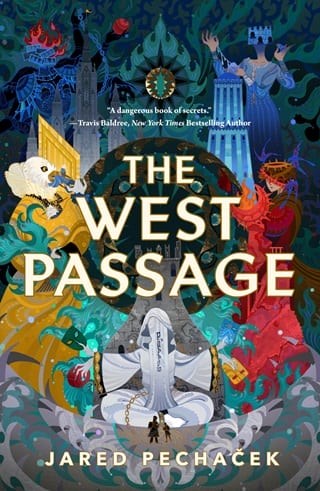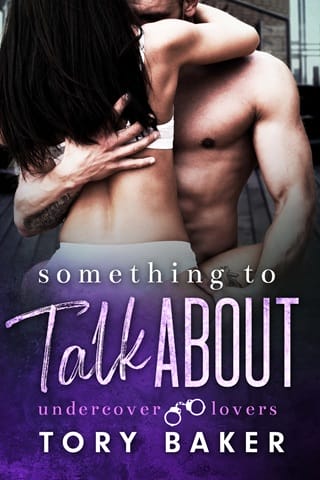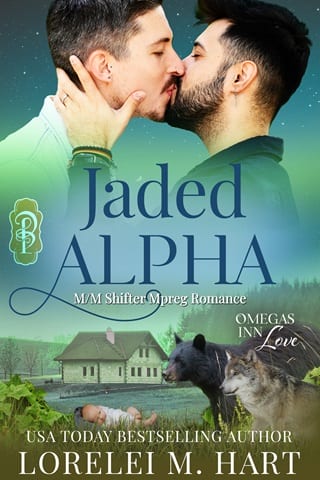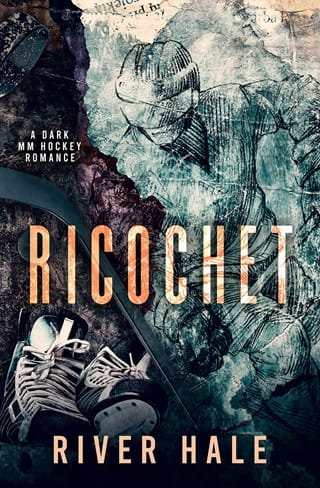24. Kew and Frin Go to the Ballroom and Join the Revels
24. Kew and Frin Go to the Ballroom and Join the Revels
Kew tried to ask Frin where to go, but his mouth and throat would not form the words. Frin tried to say something as well, but had the same problem. They met each other's eyes in horror.
You will not speak to anyone but the Willow Lady . It had not been a command, but a promise. Neither of them had any idea where the Willow Lady was, though, nor how long it would take to reach her. And this level of the tower seemed completely abandoned.
Seeing huge swathes of the palace empty was nothing new to either of them. Grey's cloisters were nearly empty; Kew had grown up at one of the last hearthfires there. Frin hailed from a small community on the edge of a disused thoroughfare, separated by long walks from everything else around. They knew the palace was depopulated just as they knew air was for breathing. But all their lives, both of them had believed Black Tower itself still thrived. At night, it glowed with life; the West Passage was full of its debris. So where was everyone?
With nothing else to do, Kew started up the stairs. Frin followed. At the top, they paused to look out the window. Perhaps getting their bearings would help.
Beyond the piers, Red Tower smoldered. Kew had never been so near it: windows were visible in its sides, and the light of its beacon licked along the edges of the piers. Snow blew toward it: winter, it seemed, was encroaching from Grey. With a shiver, he turned to go up the left-hand staircase. There was a faint glimmering trail up it, like the light left by a spilled lantern. Immediately Kew decided that this was the way to go. He got Frin's attention and pointed.
Frin did not understand. He thought Kew was simply indicating a direction. The light was invisible to him. But he was relieved that someone had made a decision.
The two boys made their way up to the galleries. Kew followed the trail through narrow halls, up more stairs (several floors' worth, all lined with niches of moldering cobwebbed statuary), and finally through a pointed-arched door onto a mezzanine. The trail seemed to end there.
The mezzanine lay about halfway up the wall of an immense room. Its ceiling was curved; had they reached the upper part of the tower's base? Five stained-glass windows lined the outer wall, rich with deeds of the Ladies. The central one was very large, even in a room that could hold hundreds. It depicted Grey Tower, and beneath it, a coiled creature shrouded in grey.
The Beast. It had to be. It was shrouded, but eyes peered out from its ashen wrappings, and it had many claws and mismatched green wings that corresponded to several pictures of it in the Bestiaries. A chain around its neck wound up to settle around the tower's own neck, as if the Beast were simply a bauble for Grey Tower to wear. All around the two, dozens of tinier figures crowded, arms upraised in fear or gratitude. Among them were women in grey, Guardians in their fierce thorny armor (the same armor Hawthorn donned for solemn ceremonies), doctors, tutors, and the other named citizens of Grey.
It took him a moment to see that behind the tower was a third figure: a black-veiled Lady, her thirteen arms outstretched as if about to catch or embrace the tower itself. In the center of her veil was a great yellow eye.
Frin was tugging on Kew's sleeve, shaking his head emphatically. He pointed along the mezzanine to a narrow staircase rising to the domed ceiling. Having nothing better to do, Kew followed. As they went, he noticed that the trail of light had not vanished: it ran along the balustrade, as if whatever left it had walked the railing. They passed a large arch leading deeper into the tower, but the trail did not go there, so Kew ignored it. Where the balustrade joined the stairs, the trail left it and went up the steps, occasionally venturing onto the wall as if seeking variety.
A voice broke the silence. It was quiet and seemed to come from someplace far away and high above, and what it said was incomprehensible. The boys came to a halt and looked at each other questioningly. After a moment, the voice stopped speaking. They waited, but it spoke no further words. They went on.
The stairs themselves slipped through a small arch and up, up, up, winding like a thread around the bobbin of the tower. Here and there, the white plaster walls were broken by huge ribs of black stone: the inner structure of the tower itself. They seemed smooth, but bore infinitesimal pitting, like the surface of a bone. The ravages of time, Kew supposed. Occasional round windows (rather dirty, and dotted with the husks of spiders) let them see out over the center of the palace: the Black courts, full of green, and the other towers with their buildings of vermillion, cerulean, golden—and cloud-grey. They were already much higher than the highest point of Grey Tower, and for the first time in their lives, they saw the edges of the palace. Beyond its ragged fringes of wall and quadrangle were distant blue hills and white mountains. That vista did not change no matter how far they went. Meanwhile, the palace rotated, constantly bringing new aspects of itself into view.
They had been walking for hours, so though Frin had been snacking at regular intervals, he opened his pack and they munched bread and fruit while sitting side by side on a windowsill, their backs to the needle of Yellow Tower. Both of them were used to chatting while they ate, Frin with the other apprentices and beekeepers, Kew with Hawthorn. Even though they were exhausted and out of breath, they still felt the urge to talk. But their throats could only make lumps of sound like misborn animals. Finally, Frin gently squeezed Kew's hand. Kew squeezed back. That was all the conversation they could make.
The voice spoke again. It was a little clearer, and the diction sounded like a proclamation, but they could understand nothing it said. Still, it was a relief to hear someone speaking at all.
After they'd walked for perhaps half an hour more, faint music began to trickle down the stairs toward them. Frin knew it as a tune that often emanated from the windows midway up the tower. Kew hardly recognized it as music at all, except that it contained the same four-note motif Sparrow used to make the lantern go. Neither of them wanted to get any closer, but they had passed no doors, and going all the way back down to the room of stained glass would mean undoing the walking of half a day.
They stopped again, partly out of hesitation and partly to relieve themselves. Kew watched the stream of his urine flow down the stairs. Just a day or two ago such a desecration would have been unthink able. Now it was hard to imagine treating Black Tower any worse than its owners did.
Why was he there? To tell the Willow Lady about the Beast, yes. But his memory of the last few days was confused. Someone seemed to have put his brain in a jar and given it a good shake. The Obsidian Lady had tamed the Beast and would ride it to the conquest of Black Tower, because she was noble and good and deserving. But also, Hawthorn had died, and with her dying words commanded him to warn the tower. They could not both be equally true. Frin could not help him, for they could not speak to each other. His whole life, Kew had depended on his own knowledge, and even this small crack in the foundation unnerved him.
The trail of light, though… His memories of Sparrow and the lantern were unclouded. Those at least were trustworthy, if not as a guide, then as a sign the world still made some kind of sense. And on a level below words, he owed it to Sparrow to follow this light. Whether it would lead him to an opportunity to repay their self-sacrifice, there was no telling. But if he stood still, Sparrow's death would surely be in vain.
Frin did not know about Sparrow. Kew wanted to tell Frin all about them, though there was very little for him to tell. Someone else should know about Sparrow. Someone else should remember. The mothers' penchant for recording everything in song made sense to him, now that something had actually happened in his life besides memorization and meals.
The music grew louder and louder. Frin tried to breathe normally. To him, of course, the four notes did not say "Sparrow." They said, "Here is the Ballroom, where you have been warned never to go."
Soon the music filled the air till they could not hear themselves breathe. Around one more turn of the stairs was a small oak door, dark with age. The music flowed from behind it, and the trail vanished under it. They looked at each other. Kew shrugged. Frin shrugged. They grinned mirthlessly. Kew opened the door.
Beyond was the biggest room either of them had ever seen. If the windows were any guide, it filled one entire floor of the tower. Red-gold light streamed from several chandeliers, and red velvet draperies lined the walls. The parquet floor shone like water. On a gallery around the top of the room, musicians played viols, dulcimers, harps, drums. On the main floor, hundreds of people were dancing. And in the center of the floor was a Lady.
The Lady towered over the other dancers. She had several arms, each outstretched to hold the hand of a partner. Her head was a spoked wheel of eyes, laid on its side with a wavering flame in the center. An exquisite black gown clung tightly to her torso, then flared out into a bell-like skirt, nearly the size of a courtyard, leaving her arms and shoulders bare. All manner of frills and laces and fringes and bobbles and trimmings covered the skirt, like growths of ivy and weeds. The wheel and her skin alike were made of a black stone shot through with red and yellow lightning. Her presence hummed throughout the room, rising and falling with the music.
The Lady's partners were half as tall as her. They were fashioned of the same black stone, and wore suits or gowns of similar intricacy to hers. For a moment, nothing seemed particularly odd about them, until Kew realized that the eye-wheel and skirt were revolving one way, her torso and partners the other. As Kew and Frin stood there, the music changed to a different brisk piece—still based on the four-note motif—and the partners stopped, bowed to the Lady and each other, and reversed direction. The wheel and gown reversed as well.
All the other dancers were an assortment of normal palace people, and they danced their own complicated set of steps and figures. Even these coincided with the movements of the Lady's group, forming great patterns on the floor so that one moment a star of dancers matched its inner points with the position of the Lady's partners; the next, several nested rings of them corresponded to the many-rayed gaze of her eyes.
Kew glanced around for the trail. It ran about a third of the way along the side of the room to a small door. Directly across from them, alternately hidden and revealed by the Lady's motion, was the grand entrance of the Ballroom, laced here and there with cobwebs.
It was then that he noticed they were being watched. Scattered about the room were motionless spectators, holding glasses of long-evaporated honey wine. Only their eyes shifted, and they had all shifted to stare at Kew and Frin, and from the nearest to the farthest, a sheen of tears was visible in every eye.
The atmosphere of the room changed. Everywhere he looked, Kew saw tears. Even the Lady wept, steam rising from her eyes, the drops splashing and running off her gown like rain. The floor shone like water because she had drowned it in her distress.
Kew tapped Frin's shoulder. He pointed at the musicians' gallery, then made a chopping motion with his hand. Frin shook his head and pointed at the door. Kew mimed tears flowing from his eyes and gestured at the whole Ballroom. After a moment, Frin nodded dubiously.
But how to get to the gallery? They stepped farther into the room. Though every eye was still upon them, nobody left their place to do anything about it. As they moved, their feet fell into the rhythm of the dance. We'll be caught if we aren't fast, Kew thought, and saw in Frin's eyes that he knew it, too.
There was no obvious way up to the gallery, unless the side door where the trail led were it. Kew followed the light, and Frin followed Kew. The door revealed another little set of stairs ( very dusty and cobwebby) that headed right to the musicians.
Dozens of them were ranged all around the gallery. They played deftly, their hands in swift, easy motion, their bodies still as stone. Over their heads, hiding their faces entirely, were dusty black hoods marked with a yellow eye. Kew shrugged and went to the nearest musician, a harpist, though Kew didn't know the instrument's name. He yanked off the hood. The harpist gave him a fearful gaze even as their fingers kept moving. Trails of dry salt marked their cheeks with white. Kew tried to still their hands, but it was like trying to halt the sun. The strings would not snap. He could not even budge the instrument itself. The longer he stood there, the more his breath and pulse slipped into the rhythm. Perhaps Frin could try.
Frin was eating bread and trying not to look at anything. Kew went to snatch the bread from his hands when he heard the harpist play a dissonant note. They were staring at the food, and something about it made their hands falter. When Kew touched the bread, the pressure of the rhythm faded away. Kew and Frin shared a questioning glance.
Frin brought the half-eaten bread closer to the harpist. Their hands slowed, breaking the chain of four notes for just a moment. Out of the corner of his eye, Kew saw the Lady falter. Her wheel wobbled in its rotation, and all her eyes fixed on him. Her hum changed key, as if in anticipation or relief.
Kew tore the bread in half, leaving part with Frin, and started down the circle of musicians, passing out crumbs. Each player left off playing to take the food and eat. The music quieted but did not stop: there were so many. He motioned to Frin for more. All around the room they went, tearing their bread into smaller and smaller pieces, then moving on to the dried fruit, then to crumbs from the wrinkles in Frin's tunic. Soon there was only a single dulcimer pounding out the four notes. It was hardly audible over the rustling and stomping of the dancers. Their heads could turn now, but their feet and hands still moved, on and on and on, catching and releasing each other, tapping out the same figures and rounds that they had for so, so long.
There was nothing left for the dulcimer player. They wept and wept, but even the crumbs were eaten. Kew spread his hands in despair.
Frin remembered the Thistle honey. He had only a little, and it was precious, but even a tiny dab might work. He uncorked the vial.
The perfume of a thousand summers filled the ballroom. Nothing had ever smelled so delicious as that honey, the essence perhaps of flowers that had been dust since the time of songs. Kew felt a chill. The Lady's eyes shed tears like fountains: among the embroidery on her gown were hundreds of thistles; who could even say what the fragrance meant to her?
Frin took a tiny drop of honey on his finger, warm and heavy as afternoon sunlight, and brought it to the musician's lips. They swallowed it and a smile of contentment spread across their face. Their hands went still. The dance ceased. The Ballroom was entirely silent.
Poof . One by one, the dancers fell to dust. Their clothes unraveled and shredded as if centuries were passing in a moment. Each of them sighed in ecstasy as they went. Dust swirled on the watery Ballroom floor. The musicians dissolved as well, the taste of food still on their lips. The yellow-eyed hoods remained. The dulcimer player lingered. Golden light flickered from their lips, struggling against the slow collapse. They started to scream just as their body finally gave in. The light died.
The Lady alone was left with her partners. Now it was clear that her "partners" were but extensions of herself, for their eyes moved with hers, and their legs walked her over to the gallery where the two boys stood.
I cannot thank you, she said as her presence filled the room, thick and rich like honey. There are no words to thank you.
Kew tried to answer her. Frin did as well. Finally they just bowed.
Why can you not speak? said the Lady. Please, answer me. I know I am not dreaming this time. Why will you say nothing? Does my sister still lie sleepless in Yellow? Does the beacon of Red still burn? Am I a song, or a story?
Kew rippled his fingers to mimic musical notes.
Please tell me, said the Lady. She released her partners' hands, and they crumbled like charcoal. All her own hands were held out to the boys, like a bouquet of flowers offered by a pleading lover. The sound of her weeping replaced the silence. Her eyes closed over her steaming tears.
With a crack, her body split asunder and fell. Her dress peeled apart into ash and soot. Her hands dropped like rotten apples to break on the floor. The wheel of eyes remained in the air a moment more, then its flame went out and it toppled, coming to rest upon her remains. The eyes froze into stony carvings.
Kew and Frin met each other's eyes. Had they—had they killed a Lady of Black Tower? Or simply released her from some punishment? Would she be back? Could the Ladies even come back? It was impossible that this act would not bring them grief later, and surely someone would be along soon, wondering what had happened.
The only thing to do was to keep moving. The trail led to a door in the musicians' gallery and up yet more stairs. They began to climb again.
 Fullepub
Fullepub 



